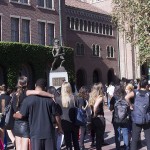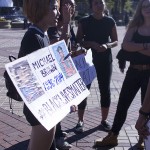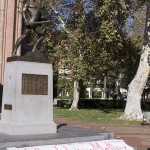Students hold campus demonstration against Ferguson decision
- Jessica Zhou | Daily Trojan
- Jessica Zhou | Daily Trojan
- Jessica Zhou | Daily Trojan
- Jessica Zhou | Daily Trojan
- Jessica Zhou | Daily Trojan
- Jessica Zhou | Daily Trojan
- Jessica Zhou | Daily Trojan
- Razan Al Marzouqi | Daily Trojan
- Matt Lemas | Daily Trojan
- Matt Lemas | Daily Trojan
- Joseph Chen | Daily Trojan
- Joseph Chen | Daily Trojan
- Joseph Chen | Daily Trojan
- Joseph Chen | Daily Trojan
- Joseph Chen | Daily Trojan
- Joseph Chen | Daily Trojan
USC students gathered in a peaceful protest around Tommy Trojan on Tuesday morning in solidarity against institutional racism. There was widespread disappointment among the protestors regarding the grand jury’s decision on Monday night to not indict officer Darren Wilson in the fatal Aug. 9 shooting of black teenager Michael Brown.
Four USC students, Danielle Hixon, Alec Tiffany, Koryn Frye-Fuentes, and Mariah Phelps, created a Facebook event dubbed “Ferguson: No Indictment,” urging fellow Trojans to wear all black clothes and join them in solidarity at Hahn Plaza.
Some of the posters held up by students in attendance read: “I’m ‘sorry’ my skin color makes it easier for you to vilify me,” “No more racist police,” “Clean protest: Will the media show this?” and “Black lives matter.”
During the event, which lasted from approximately 11 a.m. to 1 p.m., demonstrators were invited to stand up and speak if they chose to do so. Students of all ethnic backgrounds got up and shared words of disappointment and heartbreak, along with words of love and appreciation for those who decided to join in the fight against racism.
One of the speakers was Andrianna Ayiotis, a sophomore majoring in biomedical engineering, who joined the protests on Figueroa Street Monday night.
“I’m a white girl, and I’m sorry because I have not experienced the racism, the institutional discrimination that a lot of you have,” Ayiotis said. “And last night, I joined in the protest and somebody said, ‘All you white folk who are here, please go up in the front because the police are not going to hurt you.’ And that’s not okay.”
One demonstrator spoke out about her discontent with some insensitive comments posted by USC students on Yik Yak, a mobile-phone application that allows for the publishing of short anonymous blurbs by people within a certain mile radius of college campuses. Some of the posts included: “Black lives matter x3/5” and “Black lives do matter, but white lives matter just a little bit more.”
For part of the demonstration, students laid down to show the injustice in law enforcement’s leaving of Brown’s body on the sidewalk for four hours after Wilson shot him. Many speakers at the rally discussed how the police’s actions toward Brown made it seem like they felt Brown’s life did not matter.
Students also recalled what they initially felt after hearing the grand jury’s verdict.
“I was sad, but my initial reaction was numbness. I think that’s what made me sad,” said Asha Anderson, a junior majoring in political science. “It wasn’t necessarily the verdict or the decision itself but the fact that I’m so numb to this happening. So many people have been killed in a similar way and there is a lack of justice.”
She went to on mention how she believes much of one’s possibility to succeed in this country is dependent on race and economic factors.
“ I think the legal system is a process that can work, but I think it’s a big issue the way that it’s set up in our country—your ability to get what you want in society depends on your access and the amount of money you have, and sometimes your skin color as well,” she said.
Princeton Parker, a senior majoring in communication who spoke during the rally, told the Daily Trojan afterward that no matter how many protestors were participating in rallies, people should be cognizant of the symbolic struggle.
“Our existence is the legitimization of our struggle,” Parker said. “We walk past these rallies all the time and we’re like, ‘Oh, it’s not the big of a deal, it’s like 30 people, it’s 40 people, it’s one person,’ but if one person is going through it, if five people are going through it, if 10 people are going through it, the struggle exists. I want to try to push that, that if this is something that keeps happening, it says very clearly that there is a problem.”

















These protestors are not interested in justice; they’re interested in promoting a delusional personal narrative, which is part of a larger agenda designed to create a “feel good” society.
Justice is based on facts and evidence, not on feelings. The protestors are not interested in facts and evidence. Hordes of Ferguson protestors took to the streets to begin their violent rampage before even reading the hundreds of pages of testimony released from the Michael Brown proceedings. And of the many thousands of other protestors who have since joined the “justice” crusade, how many have actually taken the time to read the aforementioned documents? I would bet it’s a very small percentage… Without having taken the time to study the available evidence surrounding the case, it’s impossible for these protestors to say they’re fighting for justice. What they’re fighting for is a pre-determined outcome they feel to be true and “good.”
But even if Darren Wilson were the monster protestors claim he is, but the evidence suggests he isn’t, it seems an absurd hypocrisy for this group that supposedly decries stereotypes to protest “racist police” nationwide (consider the photo showing protestors camped outside of LAPD headquarters) as if to say all police officers are the same as one single officer thousands of miles away. Isn’t that a bit stereotypical?
Thus, this protest movement stays true to neither to facts nor principles, with senseless anger at the establishment seeming to serve as its main guiding force and the protestors seeking to relieve that anger above all. Protestors put down police in a seeming attempt to feel better about themselves. But life isn’t always fair, people aren’t always nice–regardless of your skin color. Individuals must move past feelings of victimization, as countless others have, including the current President of the United States, who is one of the most powerful leaders in the world despite, incidentally, being a man of color.
What happened to Michael Brown is tragic. We must constantly work to improve our society so that young people aren’t being killed, regardless of the circumstances. But in this particular case, we can’t allow our grief, understandable as it may be, to cloud our judgment to the point of fighting for a nonsensical cause.